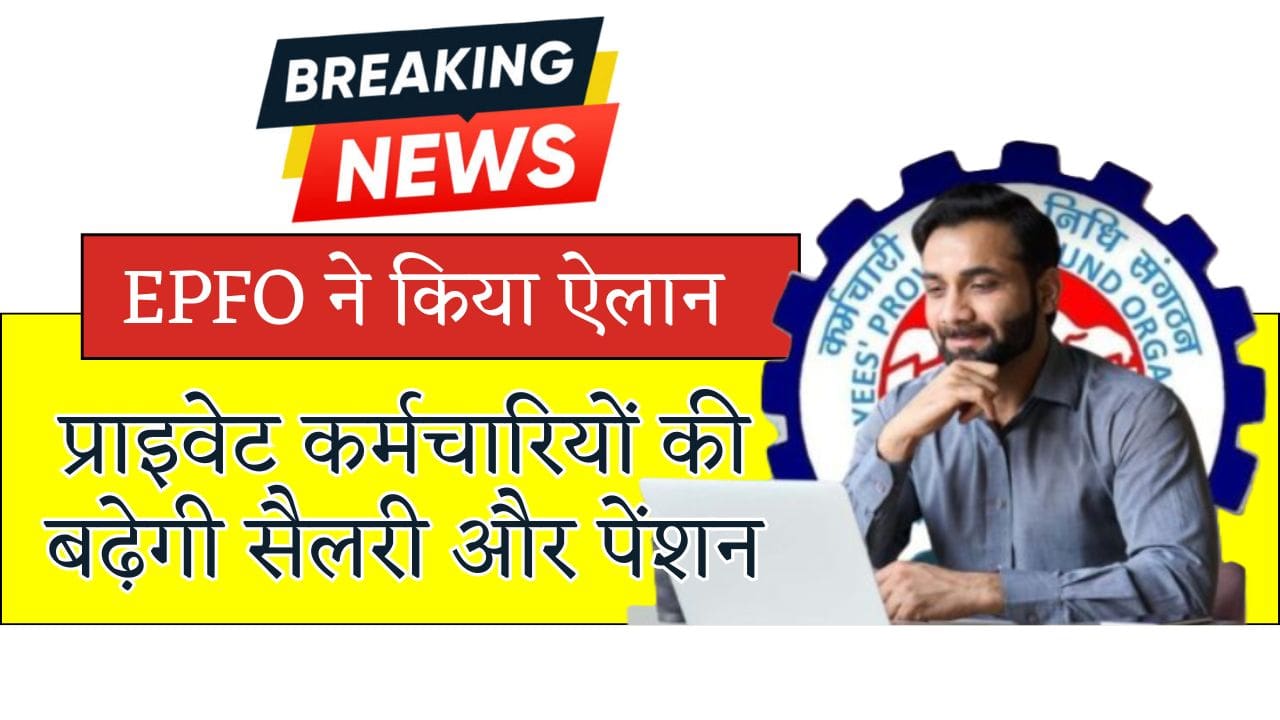EPFO Salary Hike 2025: The Employees’ Provident Fund Organisation (EPFO) is gearing up for a major reform that could significantly enhance the financial well-being of millions of private sector employees across India. With proposed updates to the salary ceiling, EPF contribution limits, and pension calculations, the upcoming changes are expected to boost both take-home pay and retirement security.
In this article, we decode everything you need to know about the EPFO Salary Hike 2025, who it affects, how much more you could save, and what you should do next.
What Is EPFO and Why These Reforms Matter?
The Employees’ Provident Fund Organisation (EPFO) is a government body under the Ministry of Labour and Employment, responsible for managing Provident Fund (PF), Employees’ Pension Scheme (EPS), and Employee Deposit Linked Insurance (EDLI) for workers in the organized sector.
As inflation rises and retirement concerns grow, the EPFO is reviewing its contribution structure to ensure better financial outcomes. If implemented, the reforms will not only boost employee savings but also improve post-retirement income.
Key Highlights EPFO Salary Hike 2025
Here are the major proposals under discussion:
- Salary cap for EPF contributions may be revised from ₹15,000 to ₹25,000–₹30,000
- Employees earning more than the current cap can now contribute more
- Monthly pension payouts may increase with higher EPS contributions
- Employers will also contribute more, increasing total retirement savings
- Voluntary higher contributions could be encouraged under new guidelines
These changes aim to align the EPF system with today’s economic landscape and employee expectations.
Proposed EPF Contribution Limits 2025
| Contribution Category | Current Limit (₹) | Proposed Limit (₹) | Change (%) |
| Basic Salary Cap | 15,000 | 25,000 – 30,000 | 66% – 100% |
| Employee Contribution | 12% | 12% | No change |
| Employer Contribution | 12% | 12% | No change |
| EPS (Pension Share) | 8.33% | 8.33% | Same % |
| Voluntary Contribution | Up to 100% | Up to 100% | More scope |
Note: A higher salary cap will mean larger contributions but also a stronger retirement fund.
How Private Sector Employees Will Benefit
The proposed update is especially advantageous for mid-level and senior professionals. Here’s how:
- Higher retirement corpus with increased EPF savings
- Better pension benefits due to higher employer contributions
- Voluntary contributions allow better retirement planning
- Financial security during retirement years
Projected Monthly Pension Before and After Hike
| Monthly Salary (₹) | Current Pension (₹) | Expected Pension (₹) | Increase (%) |
| 15,000 | 2,750 | 2,750 | No change |
| 20,000 | Not Eligible | 3,500 – 4,000 | New Benefit |
| 25,000 | Not Eligible | 4,500 – 5,200 | New Benefit |
| 30,000 | Not Eligible | 5,800 – 6,500 | New Benefit |
| 40,000 | Not Eligible | 8,200 – 9,500 | New Benefit |
| 50,000 | Not Eligible | 9,800 – 11,000 | New Benefit |
Disclaimer: These are estimated figures based on existing formulas and expected reform outcomes.
Smart Financial Planning With EPF
Here’s why the updated EPF structure is a smart financial move:
- Tax Benefits under the Section 80C (up to ₹1.5 lakh)
- Attractive Interest Rates (8%–8.5% annually)
- Loan Facilities for home, medical, or education needs
- Retirement Security for long-term peace of mind
What Should Employees Do Next?
- Review your salary structure for EPF eligibility
- Talk to HR about voluntary contribution options
- Optimize your tax-saving investments
- Track updates from EPFO official channels
What Employers Need to Prepare For?
- Adjust payroll systems for revised contribution limits
- Communicate clearly with employees about the reforms
- Budget for increased employer contributions
- Consider voluntary opt-ins based on compensation strategy
Challenges to Watch
While the outlook is positive, some potential concerns include:
- Slight dip in take-home salary for some employees
- Cost implications for smaller organizations
- Uncertainty over implementation timeline and mandatory status
Conclusion
The EPFO Salary Hike 2025 is a game-changing move aimed at improving the financial health of India’s working population. With bigger savings, better pensions, and stronger retirement planning, this reform is set to offer long-term security for private sector employees.
FAQs About EPFO salary hike 2025
When will the EPFO salary hike 2025 be implemented?
The proposal is under active consideration. A formal implementation date is expected soon.
Will my take-home salary reduce due to higher EPF contribution?
Possibly, but only slightly. The increase in savings outweighs the short-term dip.
Who benefits most from the new EPFO reforms?
Mid and senior-level employees with basic pay above ₹15,000.
Can I opt for higher EPF contributions voluntarily?
Yes, under the Voluntary Provident Fund (VPF), you can contribute up to 100% of your basic pay.
Will employers also contribute more?
Yes, employers will have to match the revised EPF contributions, increasing total retirement benefits.







